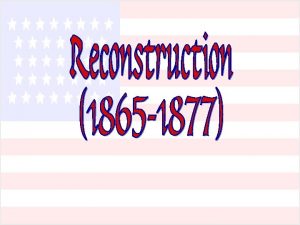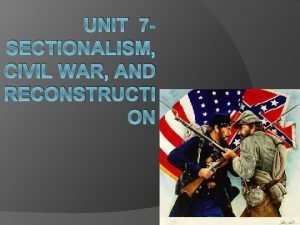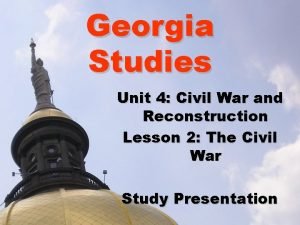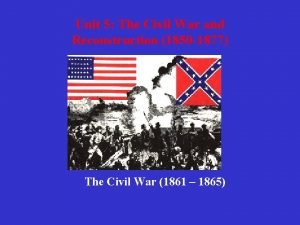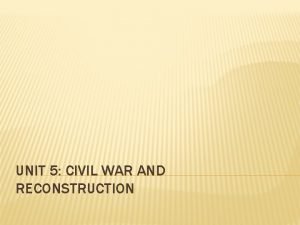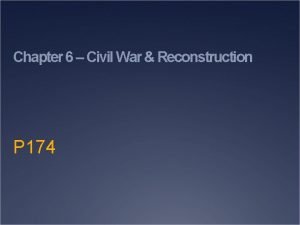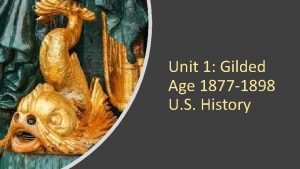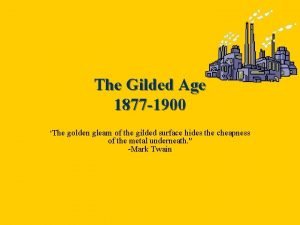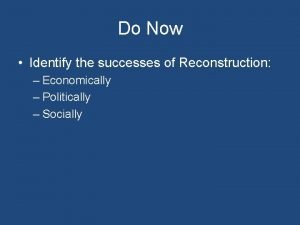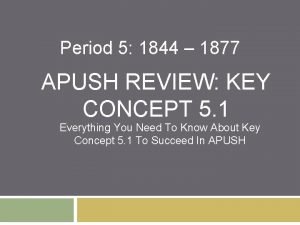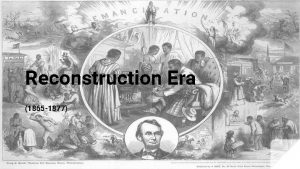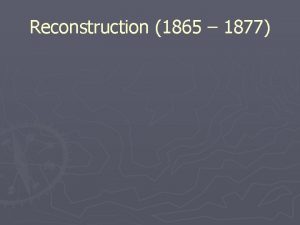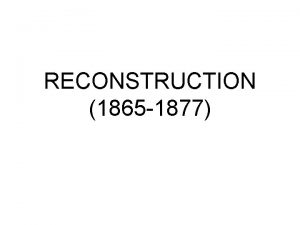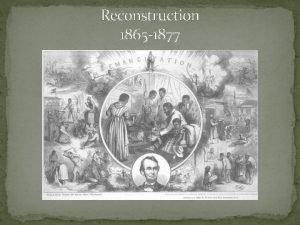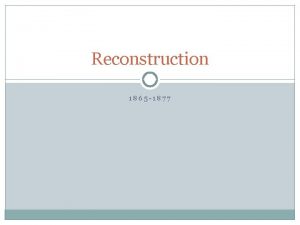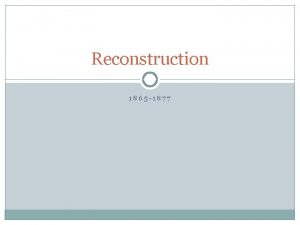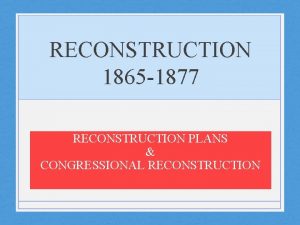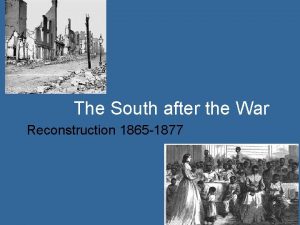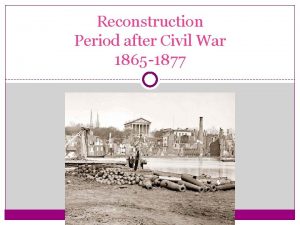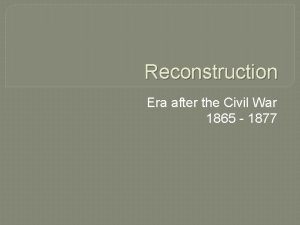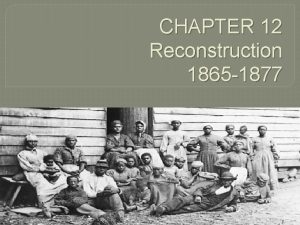PostCivil War Reconstruction 1865 1877 1 After the
















- Slides: 16

Post-Civil War: Reconstruction (1865 -1877) 1

After the War: • In much of the South: farms destroyed…bitterness & resentment • The country needed to be healed 2

3

Richmond – the Confederate capital 4

Reconstruction • the era of reuniting the nation and rebuilding the southern states without slavery. 5

What needed to be reconstructed? • • Cities, towns and farms = ruined Crop failures and high priced food = starvation Confederate economy = in ruins Where would the freed people go and what would they do? 6

Lincoln’s “ 10% plan” • A “gentle” approach to reunite the country as • 1. 2. • quickly & painlessly as possible Offered to pardon southerners for all illegal acts during the rebellion (Civil War) IF: Swear oath of loyalty to U. S. Agree slavery was illegal Once 10% of voters in a state did these 2 things, they could form a new gov’t & again be part of the U. S. 7

The Congressional Plan • Republicans in Congress argued that the Congress should have a say in how the South was reconstructed • The Radical Republicans thought Lincoln’s plan did not punish the South enough, so they came up with their own plan: the Wade-Davis Bill 8

The Wade-Davis Bill 1. Each state had to ban slavery 2. 50% of voters (adult males) in that state had to take a loyalty oath 3. Only Southerners that swore they had never supported the Confederacy could vote or hold office -President Lincoln vetoed this bill 9

Assassination • April 14, 1865 - Lincoln went to a play at • • Ford’s Theater (5 days after war over) Southerner John Wilkes Booth sneaks into Lincoln’s box & shoots him Lincoln died next day, his Vice-President, Andrew Johnson was sworn in 10

The new President: Andrew Johnson • • A DEMOCRAT former slave holder 11

Lincoln Conspirators Hanged! 12

Reconstruction under Andrew Johnson • • Continued Lincoln’s plans Pardoned 1, 000’s of ex-Confeds Approved new state constitutions in southern state (many written by ex-Confeds) Congress passed 13 th, 14 th, and 15 th Amendments 13 th: 14 th: 15 th: Abolish slavery made former slaves citizens gave freed men right to vote 13

Reaction by southern whites: • “black codes”: laws to restrict freedom of freed men (e. g. , illegal to testify v. whites, illegal to be unemployed) • Widespread acts of violence • Ku Klux Klan born - (ex-Confed. Nathan Bedford Forrest) 14

Military Reconstruction • To curb violence and corruption, south divided into 5 military districts • Law ‘n order maintained by U. S. Army 15

End of Reconstruction • Disputed vote count in 1876 Presidential election • Democrats conceded victory to Republicans (U. S. Grant) in exchange for complete withdrawal of fed’l troops in the south 16
 1877-1865
1877-1865 John 14 1-3
John 14 1-3 After me after me after me
After me after me after me Quizlet
Quizlet Unit 4: civil war and reconstruction
Unit 4: civil war and reconstruction Unit 5 civil war and reconstruction
Unit 5 civil war and reconstruction Civil war and reconstruction study guide
Civil war and reconstruction study guide Reconstruction vocabulary words
Reconstruction vocabulary words Chapter 6 civil war and reconstruction
Chapter 6 civil war and reconstruction 1877 to 1918 cloze notes
1877 to 1918 cloze notes Gilded age union strikes
Gilded age union strikes The gilded age 1877 to 1898 worksheet answers
The gilded age 1877 to 1898 worksheet answers Compromise of 1877 apush
Compromise of 1877 apush 1877 golden 1
1877 golden 1 Whats the compromise of 1877
Whats the compromise of 1877 Great railroad strike of 1877 significance
Great railroad strike of 1877 significance Apush period 5 key concepts
Apush period 5 key concepts
